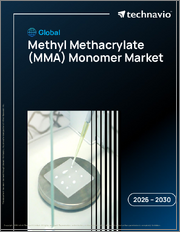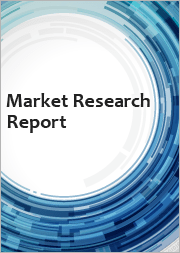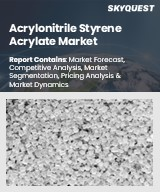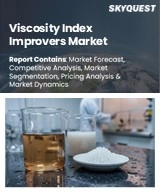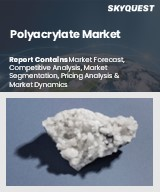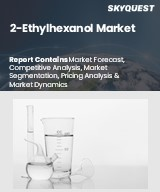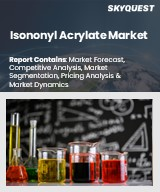
|
시장보고서
상품코드
1913113
아크릴산 이소노닐 시장 규모, 점유율, 성장 분석 : 제품 유형별, 용도별, 최종사용자별, 등급별, 판매 채널별, 지역별 - 업계 예측(2026-2033년)Isononyl Acrylate Market Size, Share, and Growth Analysis, By Product Type (Butyl Acrylate, 2-Ethylhexyl Acrylate), By Application (Printing Inks, Coatings), By End User, By Grade, By Sales Channel, By Region - Industry Forecast 2026-2033 |
||||||
세계의 아크릴산 이소노닐 시장 규모는 2024년에 143억 5,000만 달러로 평가되며, 2025년 149억 3,000만 달러에서 2033년까지 204억 3,000만 달러로 성장할 전망입니다. 예측 기간(2026-2033년)의 CAGR은 4%로 예측됩니다.
세계 이소노닐 아크릴레이트 시장은 자동차, 포장, 전자기기 등 주요 분야에서 고성능 감압 접착제에 대한 수요가 급증하면서 견고한 성장세를 보이고 있습니다. 이 모노머는 뛰어난 유연성, 내구성, 내화학성을 갖추고 있으며, 장기적인 접착력과 내후성이 요구되는 접착제 및 코팅재에 적합하며, 우수한 유연성, 내구성, 내화학성으로 높은 평가를 받고 있습니다. 주요 시장 성장 촉진요인으로는 자동차 생산량 증가, 특히 전기자동차 증가, 도시화 추세, 아시아태평양의 인프라 투자 확대 등을 꼽을 수 있습니다. 또한 지속가능한 제품에 대한 소비자 및 규제 당국의 압력으로 인해 제조업체는 이소노닐 아크릴레이트의 바이오 및 저휘발성 유기 화합물(VOC) 대체품 개발을 모색하고 있습니다. 고분자 화학의 혁신과 자동차 및 전자기기 분야의 경량화 소재에 대한 집중은 시장 전망을 한층 더 높이고 있지만, 석유화학 원료의 가격 변동과 환경 규제와 관련된 과제는 여전히 남아있습니다.
세계 이소노닐 아크릴레이트 시장 성장 촉진요인
세계 이소노닐 아크릴레이트 시장은 포장, 자동차, 전자기기 등 다양한 분야에서 감압 접착제에 대한 수요가 급증하고 있습니다. 우수한 접착력, 내구성, 높은 내화학성 등의 특성으로 인해 라벨, 테이프, 연포장 등 다양한 용도에 최적의 소재로 선택되고 있습니다. 또한 E-Commerce의 확대와 물류의 복잡성으로 인해 변조 방지성과 내후성을 겸비한 접착제의 필요성이 부각되어 시장을 더욱 촉진하고 있습니다. 산업이 계속 진화하는 가운데, 이소노닐 아크릴레이트의 다용도성은 이러한 새로운 접착제 수요를 충족시키는 데 중요한 역할을 할 가능성이 높습니다.
세계 이소노닐 아크릴산 시장 성장 억제요인
휘발성 유기화합물(VOC) 배출을 줄이기 위한 엄격한 환경 규제로 인해 전 세계 이소노닐 아크릴산 시장은 심각한 제약에 직면해 있습니다. 이러한 규제로 인해 제조업체들은 배출 관리, 지속가능한 배합 개발, 환경 기준 준수를 위한 적합성 테스트에 많은 자원을 투입해야 합니다. 그 결과, 생산비용이 상승하여 수익성에 영향을 미칠 수 있습니다. 또한 유럽연합(EU)의 REACH 규제 등 법령에 따라 보다 안전하고 지속가능하며 투명한 배합의 사용이 요구되고 있으며, 이는 신규 시장 진입을 원하는 기업에게 또 다른 도전이 되고 있습니다. 이러한 규제 상황은 시장 진입과 혁신을 복잡하게 만들고, 시장 전체의 성장 가능성을 저해하는 요인으로 작용하고 있습니다.
세계 이소노닐 아크릴산 시장 동향
세계 이소노닐 아크릴레이트 시장은 지속가능성과 바이오 혁신을 향한 두드러진 추세의 영향을 점점 더 많이 받고 있습니다. 이는 제조업체들이 엄격한 환경 규제와 친환경 제품에 대한 소비자 수요 증가에 대응하기 위해 친환경 배합을 우선시하고 있기 때문입니다. 이러한 변화는 특히 자동차, 포장, 전자제품 등 주요 산업에서 두드러지게 나타나고 있으며, 저 VOC 및 생분해성 접착제 및 코팅제에 대한 수요가 증가하고 있습니다. 각 사들은 재생한 원료 발굴을 위한 연구개발에 투자하여 지속가능한 대체품의 성장기반을 구축하는 한편, 친환경과 더불어 진화하는 시장에서의 경쟁우위를 강화하기 위해 노력하고 있습니다.
자주 묻는 질문
목차
서론
- 조사의 목적
- 조사 범위
- 정의
조사 방법
- 정보 조달
- 2차와 1차 데이터 방법
- 시장 규모 예측
- 시장 전제조건과 제한
개요
- 세계 시장 전망
- 공급과 수요 동향 분석
- 부문별 기회 분석
시장 역학과 전망
- 시장 규모
- 시장 역학
- 촉진요인과 기회
- 억제요인과 과제
- Porter의 산업 분석
주요 시장 인사이트
- 주요 성공 요인
- 경쟁의 정도
- 주요 투자 기회
- 시장 에코시스템
- 시장의 매력 지수(2025년)
- PESTEL 분석
- 거시경제 지표
- 밸류체인 분석
- 가격 분석
세계의 아크릴산 이소노닐 시장 규모 : 제품 유형별 & CAGR(2026-2033)
- 아크릴산 부틸
- 아크릴산 2-에틸헥실
- 아크릴산 메틸
- 아크릴산 에틸
세계의 아크릴산 이소노닐 시장 규모 : 용도별 & CAGR(2026-2033)
- 인쇄 잉크
- 코팅
- 접착제 및 실란트
- 섬유용 코팅제
세계의 아크릴산 이소노닐 시장 규모 : 최종사용자별 & CAGR(2026-2033)
- 포장
- 건설
- 자동차
- 소비재
세계의 아크릴산 이소노닐 시장 규모 : 등급별 & CAGR(2026-2033)
- 표준 등급
- 하이등급
- 프리미엄 등급
세계의 아크릴산 이소노닐 시장 규모 : 판매 채널별 & CAGR(2026-2033)
- 직접 판매
- 유통 채널
- 온라인 플랫폼
세계의 아크릴산 이소노닐 시장 규모 : 지역별 & CAGR(2026-2033)
- 북미
- 미국
- 캐나다
- 유럽
- 독일
- 스페인
- 프랑스
- 영국
- 이탈리아
- 기타 유럽 지역
- 아시아태평양
- 중국
- 인도
- 일본
- 한국
- 기타 아시아태평양
- 라틴아메리카
- 브라질
- 기타 라틴아메리카 지역
- 중동 및 아프리카
- GCC 국가
- 남아프리카공화국
- 기타 중동 및 아프리카
경쟁 정보
- 상위 5사의 비교
- 주요 기업의 시장 포지셔닝(2025년)
- 주요 시장 기업이 채택한 전략
- 최근 시장 동향
- 기업의 시장 점유율 분석(2025년)
- 주요 기업의 기업 개요
- 기업의 상세
- 제품 포트폴리오 분석
- 기업의 부문별 점유율 분석
- 매출의 전년대비 비교(2023-2025년)
주요 기업 개요
- BASF SE(Germany)
- Nippon Shokubai Co., Ltd.(Japan)
- Mitsubishi Chemical Group(Japan)
- Sinopec(China)
- Arkema S.A.(France)
- LG Chem(South Korea)
- Kuraray Co., Ltd.(Japan)
- Evonik Industries AG(Germany)
- Dow Chemical Company(USA)
- Shanghai Huayi Acrylic Acid Co., Ltd.(China)
- Sumitomo Chemical Co., Ltd.(Japan)
- Toagosei Co., Ltd.(Japan)
- Lucite International(UK)
- Formosa Plastics Corporation(Taiwan)
- Wanhua Chemical Group(China)
- Zhejiang Satellite Petrochemical Co., Ltd.(China)
- Sasol Chemicals(South Africa)
- Qatar Chemical Company(Qatar)
- INEOS Group(UK)
- Oxea(Germany)
결론과 제안
KSA 26.01.28Global Isononyl Acrylate Market size was valued at USD 14.35 Billion in 2024 and is poised to grow from USD 14.93 Billion in 2025 to USD 20.43 Billion by 2033, growing at a CAGR of 4% during the forecast period (2026-2033).
The global Isononyl Acrylate market is experiencing robust growth fueled by surging demand for high-performance pressure-sensitive adhesives across key sectors such as automotive, packaging, and electronics. This monomer is prized for its superior flexibility, durability, and chemical resistance, making it ideal for adhesives and coatings that require long-lasting bonding and weather resistance. Significant market drivers include increased automotive production, especially in electric vehicles, urbanization trends, and heightened infrastructure investments in the Asia-Pacific region. Additionally, consumer and regulatory pressures for sustainable products are prompting manufacturers to explore bio-based and low-VOC variants of Isononyl Acrylate. Innovations in polymer chemistry and an emphasis on lightweight materials in automotive and electronics further elevate market prospects, although challenges remain linked to price fluctuations of petrochemical feedstocks and environmental regulations.
Top-down and bottom-up approaches were used to estimate and validate the size of the Global Isononyl Acrylate market and to estimate the size of various other dependent submarkets. The research methodology used to estimate the market size includes the following details: The key players in the market were identified through secondary research, and their market shares in the respective regions were determined through primary and secondary research. This entire procedure includes the study of the annual and financial reports of the top market players and extensive interviews for key insights from industry leaders such as CEOs, VPs, directors, and marketing executives. All percentage shares split, and breakdowns were determined using secondary sources and verified through Primary sources. All possible parameters that affect the markets covered in this research study have been accounted for, viewed in extensive detail, verified through primary research, and analyzed to get the final quantitative and qualitative data.
Global Isononyl Acrylate Market Segments Analysis
Global Isononyl Acrylate Market is segmented by Product Type, Application, End User, Grade, Sales Channel and region. Based on Product Type, the market is segmented into Butyl Acrylate, 2-Ethylhexyl Acrylate, Methyl Acrylate and Ethyl Acrylate. Based on Application, the market is segmented into Printing Inks, Coatings, Adhesives and Sealants and Textile Coatings. Based on End User, the market is segmented into Packaging, Construction, Automotive and Consumer Products. Based on Grade, the market is segmented into Standard Grade, High Grade and Premium Grade. Based on Sales Channel, the market is segmented into Direct Sales, Distribution Channels and Online Platforms. Based on region, the market is segmented into North America, Europe, Asia Pacific, Latin America and Middle East & Africa.
Driver of the Global Isononyl Acrylate Market
The Global Isononyl Acrylate market is driven by an upsurge in the demand for pressure-sensitive adhesives across diverse sectors, including packaging, automotive, and electronics. Its superior qualities, such as exceptional adhesion, durability, and strong chemical resistance, make Isononyl Acrylate the material of choice for various applications like labels, tapes, and flexible packaging. Additionally, the expansion of e-commerce and the intricacies of logistics highlight the necessity for adhesives that offer tamper-resistance and weather resistance, further propelling the market. As industries continue to evolve, the versatility of Isononyl Acrylate is likely to play a crucial role in meeting these emerging adhesive needs.
Restraints in the Global Isononyl Acrylate Market
The Global Isononyl Acrylate market faces significant constraints due to stringent environmental regulations targeting the reduction of volatile organic compound (VOCs) emissions. These regulations compel manufacturers to allocate substantial resources towards emissions control, sustainable formulation development, and compliance testing to align with environmental standards. As a result, production costs can escalate, affecting profitability. Additionally, regulations such as REACH from the European Union necessitate the use of safer, more sustainable, and transparent formulations, posing further challenges for companies looking to penetrate new markets. This regulatory landscape complicates market entry and innovation, thereby hindering overall market growth potential.
Market Trends of the Global Isononyl Acrylate Market
The Global Isononyl Acrylate market is increasingly influenced by a prominent trend toward sustainability and bio-based innovations, as manufacturers prioritize eco-friendly formulations to align with stringent environmental regulations and growing consumer demand for green products. This shift is particularly evident in key industries like automotive, packaging, and electronics, where the push for low-VOC and biodegradable adhesives and coatings is gaining momentum. Companies are investing in research and development to explore renewable feedstocks, establishing a foundation for the growth of sustainable alternatives and enhancing their competitive edge in a market that's evolving in tandem with ecological considerations.
Table of Contents
Introduction
- Objectives of the Study
- Scope of the Report
- Definitions
Research Methodology
- Information Procurement
- Secondary & Primary Data Methods
- Market Size Estimation
- Market Assumptions & Limitations
Executive Summary
- Global Market Outlook
- Supply & Demand Trend Analysis
- Segmental Opportunity Analysis
Market Dynamics & Outlook
- Market Overview
- Market Size
- Market Dynamics
- Drivers & Opportunities
- Restraints & Challenges
- Porters Analysis
- Competitive rivalry
- Threat of substitute
- Bargaining power of buyers
- Threat of new entrants
- Bargaining power of suppliers
Key Market Insights
- Key Success Factors
- Degree of Competition
- Top Investment Pockets
- Market Ecosystem
- Market Attractiveness Index, 2025
- PESTEL Analysis
- Macro-Economic Indicators
- Value Chain Analysis
- Pricing Analysis
Global Isononyl Acrylate Market Size by Product Type & CAGR (2026-2033)
- Market Overview
- Butyl Acrylate
- 2-Ethylhexyl Acrylate
- Methyl Acrylate
- Ethyl Acrylate
Global Isononyl Acrylate Market Size by Application & CAGR (2026-2033)
- Market Overview
- Printing Inks
- Coatings
- Adhesives and Sealants
- Textile Coatings
Global Isononyl Acrylate Market Size by End User & CAGR (2026-2033)
- Market Overview
- Packaging
- Construction
- Automotive
- Consumer Products
Global Isononyl Acrylate Market Size by Grade & CAGR (2026-2033)
- Market Overview
- Standard Grade
- High Grade
- Premium Grade
Global Isononyl Acrylate Market Size by Sales Channel & CAGR (2026-2033)
- Market Overview
- Direct Sales
- Distribution Channels
- Online Platforms
Global Isononyl Acrylate Market Size & CAGR (2026-2033)
- North America (Product Type, Application, End User, Grade, Sales Channel)
- US
- Canada
- Europe (Product Type, Application, End User, Grade, Sales Channel)
- Germany
- Spain
- France
- UK
- Italy
- Rest of Europe
- Asia Pacific (Product Type, Application, End User, Grade, Sales Channel)
- China
- India
- Japan
- South Korea
- Rest of Asia-Pacific
- Latin America (Product Type, Application, End User, Grade, Sales Channel)
- Brazil
- Rest of Latin America
- Middle East & Africa (Product Type, Application, End User, Grade, Sales Channel)
- GCC Countries
- South Africa
- Rest of Middle East & Africa
Competitive Intelligence
- Top 5 Player Comparison
- Market Positioning of Key Players, 2025
- Strategies Adopted by Key Market Players
- Recent Developments in the Market
- Company Market Share Analysis, 2025
- Company Profiles of All Key Players
- Company Details
- Product Portfolio Analysis
- Company's Segmental Share Analysis
- Revenue Y-O-Y Comparison (2023-2025)
Key Company Profiles
- BASF SE (Germany)
- Company Overview
- Business Segment Overview
- Financial Updates
- Key Developments
- Nippon Shokubai Co., Ltd. (Japan)
- Company Overview
- Business Segment Overview
- Financial Updates
- Key Developments
- Mitsubishi Chemical Group (Japan)
- Company Overview
- Business Segment Overview
- Financial Updates
- Key Developments
- Sinopec (China)
- Company Overview
- Business Segment Overview
- Financial Updates
- Key Developments
- Arkema S.A. (France)
- Company Overview
- Business Segment Overview
- Financial Updates
- Key Developments
- LG Chem (South Korea)
- Company Overview
- Business Segment Overview
- Financial Updates
- Key Developments
- Kuraray Co., Ltd. (Japan)
- Company Overview
- Business Segment Overview
- Financial Updates
- Key Developments
- Evonik Industries AG (Germany)
- Company Overview
- Business Segment Overview
- Financial Updates
- Key Developments
- Dow Chemical Company (USA)
- Company Overview
- Business Segment Overview
- Financial Updates
- Key Developments
- Shanghai Huayi Acrylic Acid Co., Ltd. (China)
- Company Overview
- Business Segment Overview
- Financial Updates
- Key Developments
- Sumitomo Chemical Co., Ltd. (Japan)
- Company Overview
- Business Segment Overview
- Financial Updates
- Key Developments
- Toagosei Co., Ltd. (Japan)
- Company Overview
- Business Segment Overview
- Financial Updates
- Key Developments
- Lucite International (UK)
- Company Overview
- Business Segment Overview
- Financial Updates
- Key Developments
- Formosa Plastics Corporation (Taiwan)
- Company Overview
- Business Segment Overview
- Financial Updates
- Key Developments
- Wanhua Chemical Group (China)
- Company Overview
- Business Segment Overview
- Financial Updates
- Key Developments
- Zhejiang Satellite Petrochemical Co., Ltd. (China)
- Company Overview
- Business Segment Overview
- Financial Updates
- Key Developments
- Sasol Chemicals (South Africa)
- Company Overview
- Business Segment Overview
- Financial Updates
- Key Developments
- Qatar Chemical Company (Qatar)
- Company Overview
- Business Segment Overview
- Financial Updates
- Key Developments
- INEOS Group (UK)
- Company Overview
- Business Segment Overview
- Financial Updates
- Key Developments
- Oxea (Germany)
- Company Overview
- Business Segment Overview
- Financial Updates
- Key Developments






